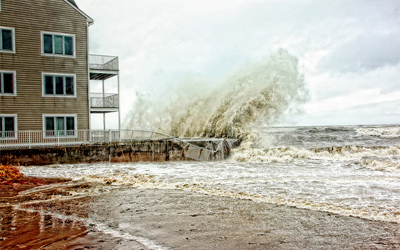Hurricane Season Started June 1: Are You Prepared?
 The National Oceanic and Atmospheric Administration (NOAA) released its predictions for the upcoming season. For the six-month hurricane season, NOAA's Atlantic Hurricane Season Outlook says there is a 70-percent likelihood of 13 to 20 named storms (winds of 39 mph or higher), of which seven to 11 could become hurricanes (winds of 74 mph or higher), including three to six major hurricanes (Category 3, 4 or 5; winds of 111 mph or higher). These ranges are well above the seasonal average of 12 named storms, six hurricanes and three major hurricanes. Colorado State University predicted an above-normal season, with about 18 named tropical storms, 9 hurricanes and 4 major hurricanes this season. The National Oceanic and Atmospheric Administration (NOAA) released its predictions for the upcoming season. For the six-month hurricane season, NOAA's Atlantic Hurricane Season Outlook says there is a 70-percent likelihood of 13 to 20 named storms (winds of 39 mph or higher), of which seven to 11 could become hurricanes (winds of 74 mph or higher), including three to six major hurricanes (Category 3, 4 or 5; winds of 111 mph or higher). These ranges are well above the seasonal average of 12 named storms, six hurricanes and three major hurricanes. Colorado State University predicted an above-normal season, with about 18 named tropical storms, 9 hurricanes and 4 major hurricanes this season.
Despite the above-normal forecast, the potential for hurricane landfall in the U.S. is expected to remain normal for the 2013 season. However, it only takes one landfall to destroy lives and livelihoods: In 2011, Hurricane Irene was the only hurricane that reached the U.S., yet killed 45 and caused over $7 billion in damages. In October 2012, Hurricane Sandy claimed over 70 lives in the U.S. and caused more than $70 billion in damages.
Now is the time for all Americans living near and along the Gulf of Mexico and Atlantic Coast to begin preparing for the upcoming hurricane season. The Federal Emergency Management Agency (FEMA), an agency of the United States Department of Homeland Security, wants citizens to be ready for the Atlantic hurricane season, which started June 1 and lasts until Nov. 30. Hurricane hazards come in many forms: storm surge, high winds, tornadoes and flooding. Preparation is the best protection against the dangers of a hurricane. On its "Natural Disaster" webpage, FEMA has numerous tips and resources on how you can prepare for a hurricane, what to do during one, and how to recover after one.
History teaches that a lack of hurricane awareness and preparation are common threads among all major hurricane disasters. By knowing your vulnerability and what actions you should take, you can reduce the effects of a hurricane disaster. |


 The National Oceanic and Atmospheric Administration (NOAA) released its predictions for the upcoming season. For the six-month hurricane season, NOAA's Atlantic Hurricane Season Outlook says there is a 70-percent likelihood of 13 to 20 named storms (winds of 39 mph or higher), of which seven to 11 could become hurricanes (winds of 74 mph or higher), including three to six major hurricanes (Category 3, 4 or 5; winds of 111 mph or higher). These ranges are well above the seasonal average of 12 named storms, six hurricanes and three major hurricanes. Colorado State University predicted an above-normal season, with about 18 named tropical storms, 9 hurricanes and 4 major hurricanes this season.
The National Oceanic and Atmospheric Administration (NOAA) released its predictions for the upcoming season. For the six-month hurricane season, NOAA's Atlantic Hurricane Season Outlook says there is a 70-percent likelihood of 13 to 20 named storms (winds of 39 mph or higher), of which seven to 11 could become hurricanes (winds of 74 mph or higher), including three to six major hurricanes (Category 3, 4 or 5; winds of 111 mph or higher). These ranges are well above the seasonal average of 12 named storms, six hurricanes and three major hurricanes. Colorado State University predicted an above-normal season, with about 18 named tropical storms, 9 hurricanes and 4 major hurricanes this season.
